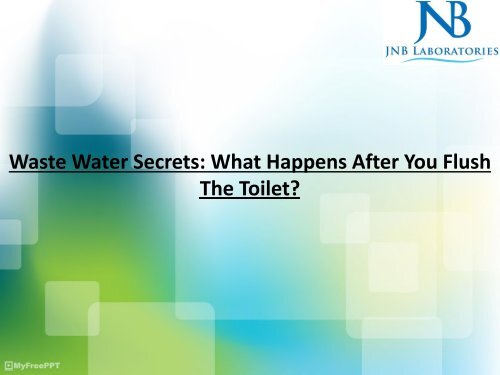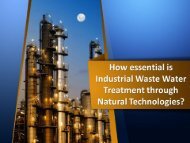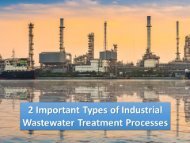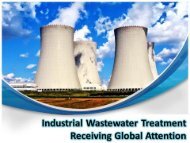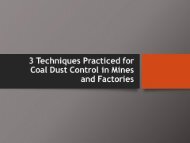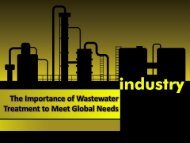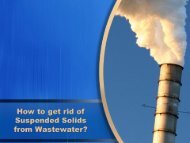Waste Water Secrets What Happens After You Flush The Toilet
http://www.jnblabs.com/
http://www.jnblabs.com/
Create successful ePaper yourself
Turn your PDF publications into a flip-book with our unique Google optimized e-Paper software.
<strong>Waste</strong> <strong>Water</strong> <strong>Secrets</strong>: <strong>What</strong> <strong>Happens</strong> <strong>After</strong> <strong>You</strong> <strong>Flush</strong><br />
<strong>The</strong> <strong>Toilet</strong>?
<strong>The</strong> second we flush, it is all over for most of us. But for others,<br />
the process of treating wastewater has just begun. If you ever<br />
wondered where it goes, or more important where it ends up,<br />
we will attempt to answer that question by taking you through<br />
the entire process.
It’s Part of Every Home and Office:<br />
Every home and business has water and generates wastewater.<br />
Once wastewater is flushed, it travels down a lateral into a main<br />
pipe that is propelled by the power of gravity. <strong>The</strong> water then<br />
eventually travels to the wastewater treatment plant. <strong>The</strong><br />
wastewater travels through miles of pipes before eventually<br />
arriving at the plant.
It’s Part of Every Home and Office:<br />
A wastewater plant can treat wastewater from residential and<br />
commercial buildings. <strong>The</strong> plant is designed to clean the sewage<br />
water, which once cleaned, is discharged to a nearby river.<br />
Before the water can be discharged to a nearby river, it has been<br />
processed in such a way, that it comes very close to tap water.
Testing <strong>Water</strong> for Pathogens:<br />
All water, be it coming into the plant of being discharged from<br />
the plant, will undergo testing for pathogens. This is to assess the<br />
quality of the water, and whether there is something to be<br />
concerned about.
Pumping Out <strong>Waste</strong> <strong>Water</strong>:<br />
Sometimes, gravity can’t do its job on delivering the wastewater.<br />
In that case, the wastewater must be pumped out using<br />
powerful pumps that suck out the water from the underground<br />
reservoir. Often, this process is carried out in designated lift<br />
stations where the water pumping process takes place. Once the<br />
lift station can lift the water, it then pumps it back into the pipes<br />
to let once again gravity take over in delivering the wastewater<br />
to its destination.
<strong>The</strong> Treatment Process:<br />
As wastewater enter the treatment plant, it first is filtered<br />
through a bar screen which is designed to remove solids. In fact,<br />
you can find a variety of things that can come through<br />
wastewater including, but not limited to diapers, underwear,<br />
bricks, toys and even false teeth. <strong>The</strong> bar screen is cleaned<br />
through a mechanical rake system, this system helps separate<br />
the trash away from the wastewater. This non-organic matter is<br />
then separated and hauled out to the landfill for disposal. More<br />
advanced wastewater treatment facilities can shred the nonorganic<br />
materials into a fine powder which can then be easily<br />
hauled to the landfill.
Grease Ball Formation:<br />
Once the wastewater passes through the bar screen, it makes it<br />
way to the wet well, where grease is collected, grease balls will<br />
naturally form where lots of grease meets each other. When<br />
grease is dumped down the toilet, it forms a ball with any solid<br />
waste item. A good example that comes to mind is the grease<br />
forming around a cigarette bud or a dish rag. Accordingly, these<br />
grease balls must be collected by staff every week or so.
Time to Appreciate <strong>You</strong>r <strong>Toilet</strong>:<br />
Now that you know how your toilet works, you’ll begin to<br />
wonder how does the Pennsylvania Industrial <strong>Water</strong> Treatment<br />
works, certainly it is far more complex than regular wastewater<br />
treatment.
Contact Us<br />
Get more detail about Pennsylvania Industrial <strong>Water</strong> Treatment<br />
works. So, visit our website or give us call.<br />
Website:<br />
www.jnblabs.com<br />
Phone:<br />
215-485-0226


